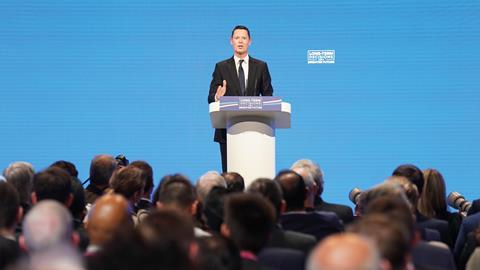The lord chancellor and home secretary sounded very different messages on the law and lawyers at the Tory party conference
One topic dominated the Conservative party conference in Manchester this week, in addition to the inevitable HS2: our old friend law and order. Justice in a wider sense rarely gets party conferences buzzing, but even less so this year, at what could be the Conservatives’ last convocation before the next general election.
The conference started promisingly, with a fringe session on problem-solving housing courts on Sunday. In a report this year the all-party parliamentary group on anti-social behaviour recommended piloting the specialist courts to tackle anti-social behaviour and issues such as persistent rent arrears. Around 1.1 million incidents of anti-social behaviour were recorded in the year ending September 2022 – although research by community safety group Resolve suggests the figure is much higher.
The event heard that anti-social behaviour is often the precursor to more serious crime. Cases involving anti-social behaviour are taking 18 months to reach trial, prolonging the suffering of victims and communities.
Could we see problem-solving housing courts in the Tory manifesto? Difficult to say, given the absence of a minister on the panel discussion. However, Conservative police and crime commissioner for Surrey Lisa Townsend, who was on the panel, thought another court was not the answer.
An event from the Institute for Government and the Bennett Institute for Public Policy on Monday offered manifesto ideas to ‘renew and reinvigorate’ the constitution. Following an 18-month review of the UK constitution, the two institutes warned ahead of the party conference season that a tumultuous period had damaged trust in UK politics, our institutions and the UK’s international reputation as a stable democracy – with further harm inflicted by a series of scandals involving ministers and MPs.
Recommendations in their Review of the UK Constitution report include a new parliamentary committee on the constitution, a new category of ‘constitutional acts’, a new list of high-level constitutional principles, and giving the public a greater role in the processes of constitutional change.
‘What is the Conservative case for constitutional reform? Indeed, is there one?’ asked IfG director Dr Hannah White at Monday’s event.
Yes, there is a Conservative case, replied former constitutional reform minister John Penrose MP – but constitutional reform needs cross-party endorsement and it needs to be done in incremental steps.
'Businesses across the globe choose our law to govern their contracts. They choose our courts to settle their disputes. Why? Because of the skill of our lawyers and the excellence of our judges'
Alex Chalk, lord chancellor and justice secretary
It was only on Tuesday that we saw clear signals of the government’s priorities for justice. Ahead of his appearance on the main conference stage, justice secretary Alex Chalk announced ‘Jade’s Law’, which will strip parental responsibility from mothers or fathers imprisoned for murdering their child’s other parent. In a separate announcement, whole-life orders will apply retrospectively to ‘vicious murderers’ not yet sentenced when new legislation comes into force.
Asked about legal aid at a Society of Conservative Lawyers event, Chalk said legal aid was a ‘profoundly good thing’ but signalled that it is a finite resource. Expanding legal aid could mean, for instance, less money for criminal defence solicitors.
Chalk added he would ‘always do everything I can within the balance of what is affordable to deliver early legal advice because it is my strong view that it is money well spent’.
However, with law and order expected to be a key battleground at the next election, the Conservatives need to align their messaging.
Chalk praised lawyers and judges in his conference speech.
‘Businesses across the globe choose our law to govern their contracts. They choose our courts to settle their disputes. Why? Because of the skill of our lawyers and the excellence of our judges. It means we have the largest legal sector in Europe, and the second-largest in the world. More than 200 overseas law firms have set up offices here, from over 40 jurisdictions. This success matters, conference, for all sorts of reasons, but chief among them is that it drives opportunity.’
Closing his speech, he said: ‘Let us take pride in what our country has contributed – probably more than any other to the international rules-based order.’
Home secretary Suella Braverman struck a rather different note: ‘Our country has become enmeshed in a dense net of international rules that were designed for another era. And it is Labour that turbocharged their impact by passing the misnamed Human Rights Act. I am surprised they didn’t call it the Criminal Rights Act,’ the former attorney general said.
Chalk and Braverman both addressed a packed conference hall – but Braverman’s speech drew the bigger cheers.
This article is now closed for comment.
































3 Readers' comments